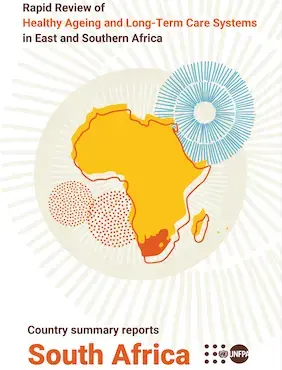South Africa had a projected total population of around 59 million in 2020, around 5 million (9 per cent) of whom were aged 60 years and over, and this is projected to increase to 16 per cent by 2050 (United Nations Department of Economic and Social Affairs, 2019). South Africa an upper-middle income country, with a ranking on the Human Development Index of 114 with a score of 0.7. Absolute poverty is high with an extreme poverty rate (those living under $1.90 per day) of 18.9, and there are significant levels of inequality with a GINI coefficient of 63 in 2014, making South Africa the most unequal country in the world (according to this measure). The country’s health expenditure is 9.1 per cent of Gross Domestic Product (GDP) (World Health Organization, n.d.).
South Africa has greater health systems capacity than most countries in the region, and there is 67 per cent coverage of essential health services as well as a very low percentage of catastrophic health spending due to free primary health care and means-tested contributions for health services. There are, however, significant differences between the public and private health-care system in terms of quality, and waiting time for, services.
South Africa provides an example of a country with a large older population and a well-established set of laws, policies and programmes for older people across various sectors, but the scale of inequality, absolute size of the older population, poor budgetary allocation to the older persons sector, and challenges with governance result in poor implementation.
This report provides an overview of population ageing and health trends in South Africa, and assesses the readiness and responsiveness of health, social welfare and long-term care systems to ageing and the needs of older people in the country. It assesses the state of frameworks and structures in place to support healthy ageing and provides a set of recommendations to inform policy development and strategic interventions going forward.


